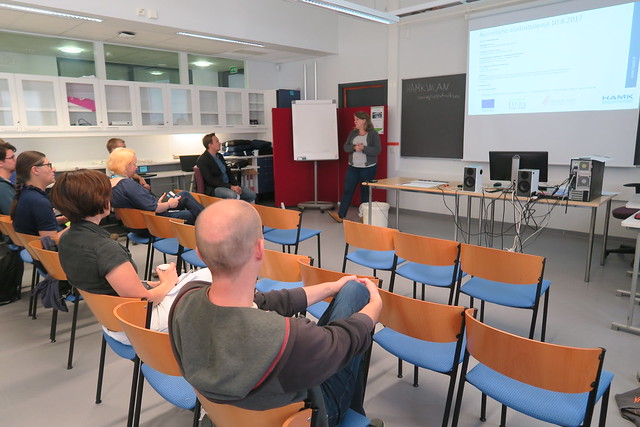Making my dissertation relevant to non-academics calls for a change in style. An invitation to speak at the Open Data Häme workshop, following announcement of funding by the European Regional Development Fund, gave a venue to unveil some normative theory-building from my research potentially useful in the real world.
This talk was fewer slides, and more talk. With 9 content slides to cover in about an hour, the agenda was:
- 1. Why does open data mean open sourcing (with commercial potential)?
- 2. When did open data begin? What’s the history?
- 3. How do behaviours change with open innovation learning?
The slides had been posted on the Coevolving Commons in advance of the event.
The slides has now been matched up with the digital audio recording, for viewing as a web video. Another voice in the mix is Minna Takala, as a Senior Advisor at Häme Regional Council.
The audio recording was exceptionally clear, and is downloadable (so boosted volume is probably unnecessary).
| Audio | |||
| Digital audio (1h03m08s) |
[20170810_Hame_Ing mp3] (58MB) [20170810_Hame_Ing 3db mp3] (volume boosted 3db, 58MB) [20170810_Hame_Ing 6db mp3] (volume boosted 6db, 58MB) |
||
Alternatively, downloadable video files may be better for people on the move.
| Video | H.264 MP4 | WebM |
| Digital video (1h03m08s) |
[Hame_Ing_HD m4v] (HD 325Kbps 238MB) [on the Internet Archive] [20170810_Hame_Ing_nHD m4v] (nHD 109Kkps 97MB) |
[20170810_Hame_Ing webm] (HD 470Kbps 212MB) [20170810_Hame_Ing nHD webm] (nHD 177Kbps 80MB) |
The first part of the talk places open data in the larger context and trend towards the behaviour of open sourcing, and open innovation. Open sourcing enables visibility into system internals, in contrast with private sourcing that makes internals opaque. The rise of open sourcing became more noticeable with the advent of open source licensing in software, but can generalized outside of technology with an example of raising and catching salmon.
The second part of the talk extracts from the detailed context work in my dissertation. Open data in government was first driven as a requirement from the EU, towards making economic reporting transparent. Its popularity rose first in the UK, and then in the U.S.A.
The third part of the talk described how open innovation (and open data) takes conscious action, rather than just happening overnight. I skipped over three descriptive theories, to focus on three normative theories — towards the interest of “what do I do with this research?”
The written dissertation is a formal scientific document that I expect only the truly diligent will ever read. An approach of multiparadigm inquiry leads to even more esoteric philosophical distinctions, useful to the completists. For the more typical person working in business and/or projects, my talks may be more accessible and understandable.



